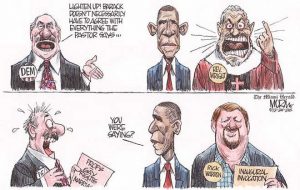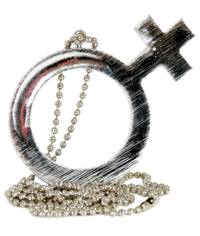Senator and current VP nominee Joseph Biden is supposed to be helping Senator and Presidential nominee Barack Obama with the Catholic vote, except Biden has a Catholic problem. Speaker Nancy Pelosi, the woman who is only two heartbeats away from the Presidency, occupies the highest post ever held by a woman in the United States’ Government. She’s Catholic, but she has a Catholic problem. Oddly enough, Biden and Pelosi have a different problem than the one that JFK faced when he ran for President. In 1960 Protestant voters worried that Kennedy might pay too much attention to the Pope if he were President. Now, 48 years later, Conservative Evangelical Protestants worry that Pelosi and Biden aren’t paying enough attention. This situation is more than odd, it’s downright confusing.
So let’s cut quickly to the chase. This is about abortion. It’s also a little bit about euthanasia and stem cells, but politically, this is about abortion. Governor Palin is pro-life. Senator McCain is pro-life. Senator Biden is pro-life. Senator Obama is pro-life. Everyone running for President or VP in the two major parties is pro-life. But let’s also be clear about our terms. The “Prolife” name brand is not the same as being pro-life. Pro-life means you want to find ways of avoiding abortions. “Prolife” means you support a particular political solution to the problem of abortions. McCain and Palin are “Prolife” and pro-life, while Obama and Biden are pro-life but not “Prolife.” Clear? Yeah, I’m having some trouble with it myself.
It seems to me that the question is one of means and ends. They all share the same end: abortions should be avoided. They differ on the means: overturn Roe v. Wade, criminalize abortion, and force mothers to carry babies to term or work to remedy economic conditions that lead to abortions, broaden sex education efforts beyond mere abstinence programs, and support poor mothers. Both sides are trying to honor their basic pro-life commitments, but they differ in the strategies they want to pursue and the other priorities they want to balance.
On a gut level, I have some sympathies with “Prolilfers.” I agree that life begins at conception, and I can understand their worries about a slippery slope and drawing firm boundaries. But I can’t help but keep my eye on the larger pro-life agenda of avoiding abortions. If that is the real goal – and Obama, Biden, McCain and Palin all agree that it is – then can’t reasonable people disagree about the best means for achieving that end? Can’t reasonable pro-life Christians disagree about the best means for achieving that end?
Several months ago Krista Tippett of NPR’s Speaking of Faith interviewed some Evangelical pastors, one of whom was Greg Boyd of Woodland Hills Church. In the course of the conversation he said something profound that is worth sharing.
“[P]olitical issues are, more often than not, very ambiguous and good and honest and decent and Bible-believing people can have the same values, but they translate into the complexity of politics in different ways, even on things like gay rights and abortion and the Iraq War and all of that. And our job as Kingdom people is to let the politics take care of itself. Vote your conscience.”
What Boyd saw that so many of us often rush by as we jump from values to votes is that we can share the same ends, but disagree about how best or most efficiently to achieve those ends. Moving from ends to means is a translation project, and there is no biblical road map in most translation cases.
The thing that is so perplexing to me is that Conservative Evangelicals know this better than anyone. Many of them agree that Jesus made advocacy on behalf of the poor a cornerstone of his ministry, but they argue that they are the true advocates for the poor when they oppose “government handouts that create dependency.” I disagree, but I can see how a well-meaning and sincere Christian might honestly think that he or she is following Jesus’s mandate even as they oppose government programs directly targeted to help the poor. They are translating Jesus’s mandate into the complexities of contemporary economics differently than I would.
The original purpose of this piece was call attention to the frankly absurd dance that politicians like Biden and Pelosi – politicians who are pro-life but not “Prolife” – must constantly perform in order to keep their critics in the Catholic Church at bay. Pelosi has had to meet with her archbishop to explain her position on abortion, while Biden had to take considerable time in an interview with Tom Brokaw to explain how it is that he can be pro-life but still oppose the tactic of criminalization as an intelligent means to that end. The challenge for these politicians is that the point being made here regarding differing strategies for attaining a common end is far too subtle to penetrate the public consciousness when our common discourse is flooded with sound bites and 30 second ads. So politicians try to fall back on the old distinction between personal faith and public policy. The truly infuriating point to me is that the Roman Catholic hierarchy should and does know better. When Brokaw pushed Biden on Meet the Press, Biden had a thoughtful, theologically nuanced answer worthy of his Catholic schooling and upbringing. We once had a President who was similarly educated. Kennedy drew a clear line between religious matters and policy decisions, but the clarity of that line is being threatened today, not by the Pope, but by the media, the voters, the pundits, and bishops all of whom seem unable to appreciate the clear distinction Kennedy made. In a now famous speech before Protestant pastors in Houston, Senator and candidate Kennedy made the following comments.
For contrary to common newspaper usage, I am not the Catholic candidate for President.
I am the Democratic Party’s candidate for President who happens also to be a Catholic.
I do not speak for my church on public matters; and the church does not speak for me. Whatever issue may come before me as President, if I should be elected, on birth control, divorce, censorship, gambling or any other subject, I will make my decision in accordance with these views — in accordance with what my conscience tells me to be in the national interest, and without regard to outside religious pressure or dictates. And no power or threat of punishment could cause me to decide otherwise.
Kennedy noted that his Catholicism surely helped to establish his priorities and values and shape his conscience, but he also stressed that the Roman Catholic hierarchy would have no say in the manner in which we ran the country i.e. the manner in which he translated those values into actions and used that consciousness to shape policy. The Protestant pastors gathered in Houston, and many Evangelicals there among them, were comforted by Kennedy’s words precisely because he showed then and there that he understood the difference between religiously ordained values and the pragmatic realities of governance and policy. In short, Kennedy was not going to let the Pope exercise a line item veto on his decision making process as President.
Fast forward to 2008, and Conservative “Prolife” Catholics and Evangelicals are chasing down pro-life Catholics who are not “Prolife” and chastising them for apostasy and hypocrisy and even denying them communion in some cases. Senator Biden is no longer welcome to receive communion in his birthplace, Scranton, Pennsylvania. In short, many Conservative Evangelicals are angry at Catholics for not being Catholic enough, for minding the very distinction that they demanded of and cheered Kennedy for 48 years ago. Thankfully the Roman Catholic hierarchy has come down on those who have denied the Eucharist to non-“Prolife” politicians, but what happens to Protestants and especially Protestants from traditions without a disciplinary hierarchy when they feel like they are the victims of sacramental vigilantes?
Let me conclude by speaking to my own kind, the intentional moderates, the Liberal Evangelicals who want to worship in radically inclusive congregations. I think that one of the things that we want is to find ways of prophetically embracing the Evangelical spirit by moving out into the entire world to preach the Gospel and worship God along side those who are not our demographic doppelgangers. If this is really what we want, then especially in the U.S. the biggest challenge may be worshiping along side those with different political affiliations and commitments. I’m not suggesting that we are not still divided racially, economically, and ethnically. We are! But most of us are at least willing to admit that this is a problem. Many of us, however, are not yet ready to say that it is in fact a problem that we are also politically segregated on Sunday mornings. There are de facto red churches and blue churches throughout this country, as surely as there are black and white, English, Spanish and Chinese churches. Moderates want purple churches, if only so that we stand out from the red and blue background, if only so that by standing out we shine like a lavender lamplight, a violet testimony to the reconciling power of the Gospel of Jesus Christ.
But we are going to have to face the challenge of begin radically moderate on the issue of abortion, because this is the issue where the proverbial rubber meats the road. It’s easy to encourage moderation when we’re talking about a “Disneyfied” version of bland “togetherism.” It’s much more difficult to work for toleration when the issues that threaten to divide us go all the way to the bottom of who we are and the ways in which we envision the world and Gospel. If this is really the case, then we are going to have to face head on the abortion issue and acknowledge that there are many ways of being passionately pro-life, and some of these ways may entail opposing the “Prolife” platform. I’m not sure that we can do it yet. I’m not sure that I can do it yet. But maybe we can begin to work toward radical Christ-centered tolerance by refusing to allow the “Prolife” issue to function as a wedge in our political thinking. I’m certainly not ready to tell anyone who to vote for (I’m not yet entirely certain who I’m voting for.), but I am ready to suggest that moderate pro-life Christians should pause this political season and consider whether or not the “Prolife” platform is the best means for accomplishing the pro-life end, and whether we are willing to allow “Prolife” politicians to use their position to create further divisions in our churches.
Read the recent article in the NY Times, “A Fight Among Catholics Over Which Party Best Reflects Church Teaching.”


